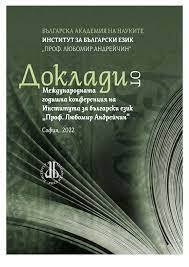Амбивалентни оценки в комуникативния процес, отразени в българските фразеологизми, пословици и поговорки
Ambivalent Valuations in Communication, Reflected in Bulgarian Phraseological Units Proverbs, and Sayings
Author(s): Teodora Rabovyanova
Subject(s): Language studies, Language and Literature Studies, Theoretical Linguistics, Applied Linguistics, Lexis, Philology
Published by: Институт за български език „Проф. Любомир Андрейчин“, Българска академия на науките
Keywords: ambivalence; valuation; speech act; phraseological units; proverbs; sayings
Summary/Abstract: The object of the paper are 45 double-natured phrases which rely on context and situation. They may depend on the desire to speak only the truth, but to conserve one’s feelings. Phraseological units that change their value about positive or negative evaluation. Often the context specifies the positive or the negative mark of the construction. There is opposition between the past and the present, accompanied by changing the assessments (+ → – and vice versa). For example, phrases with stylistic note ʽrebelliousnessʼ are positively marked (i duma da ne stava = I will not hear of it; vikam s palen glas; na visok glas = in a loud voice; pravo, kume, v ochi = straight out, without mincing the matter; flat and plain; dumata mu na dve ne stave = his word is law; ne tsepya basma = not mince one’s words). They oppose to ʽobedienceʼ (stiga da reche „kuku“; ne karsha prikazkata / dumata na dve; zhenata me vodi za ezika) and ʽmasking the truthʼ (edno mu e na sartseto, drugo mu e na ustata = he wears his heart upon his sleeve; s okolni dumi; shlevya se kato zhaba; imam prikazka za nyakogo; kazvam dve dumi; Ne go usukvaj kilifarski! Usukvam go po kilifarski = don’t beat about the bush, get to the point). Another opposition is built about the silence as ʽpreserving a secretʼ and ʽbreaking one’s promice / wordʼ (compare the semantic and the etymology of the expression izplyuvam kamacheto = spill the beans). We also look at the stylistics of double-natured phraseological units (in comparison with artistic devices, used in negatively and positively charged expressions) to explain their power of expression and aesthetic effect in speech.
- Page Range: 149-156
- Page Count: 7
- Publication Year: 2022
- Language: Bulgarian
- Content File-PDF

